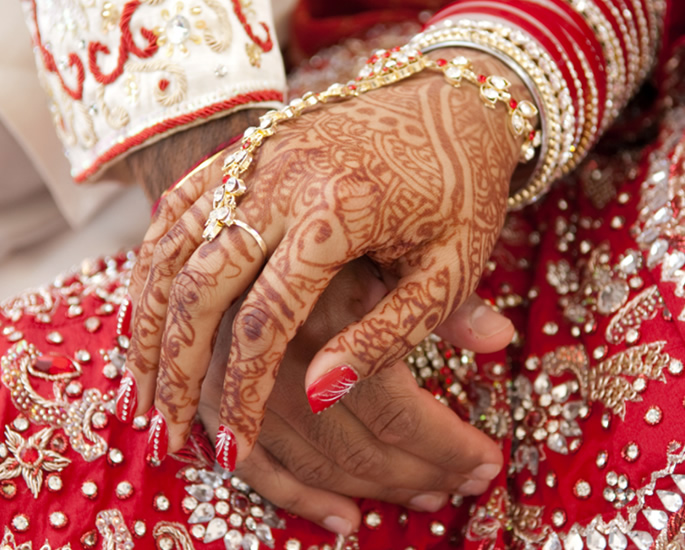"I start shivering and cannot seem to get over this fear"
In the 21st-century mental health issues are becoming more prominent across the world and in South Asian families too.
However, it seems that some of the roots of such issues are coming from South Asian families themselves.
Is Desi culture and norms causing mental health issues?
Are the high standards of the community crushing the mental health of the youth?
After all these years, the toxic stigma and ignorance towards mental health issues in the South Asian community, is taking its toll.
South Asian Families & Pressure
Within South Asian families there can be a lot of pressure to be the best.
The best child. The best role models. The best student. The list goes on.
In the South Asian community, reputation has been of high value for centuries.
Children, specifically, are the main carriers of the family’s reputation.
Hence the pressure is on them to maintain the family name and status.
The phrase, ‘what will people say/think?’ is not uncommon in a Desi household.
It is this very phrase that increases the pressure as children feel responsible to uphold a good family name.
The way children and young people from South Asian families are viewed in the community is seen as a demonstration of their behaviour reflective of their upbringing.
It is a vicious cycle, which leads back to the whole family.
If the youth are not meeting the community standard, then the parents are seen to have failed in their job.
Thus, giving the family a bad reputation.
Jamshed from Coventry says:
“As a kid, I had no interest in school or studies. I hung around similar lads.
“My parents would get very angry and annoyed with me no matter what I did.
“They said I was giving the family a bad name and threatened to marry me off abroad to some village girl.
“The pressure of getting married really got to me and because I had a non-Asian girlfriend and was happy.
“This affected my anger towards everyone and my emotions got really out of control, where I needed professional help.”
Pressure can manifest in many different areas of life for South Asian youth.
If failure is an outcome then the pressure related to it on a young Desi person can lead to many mental health issues.
The Value of Marriage
In most South Asian families, ALL children are expected to get married when they are older.
The general expectation is that they will be married at least before they are 30 years of age.
If they are not married by this age, the Desi community has a ’cause for concern’.
It raises concern on the unmarried individual and they may be viewed as difficult to marry.
This tends to be the case more so for women than men.
It is important that the youth of South Asian families marry someone from a family with a good reputation.
Arranged marriage is common, as it mitigates the chances of one finding a partner that may not be approved of by family and relatives.
The pressure is further enforced in accepting such proposals for both bride and groom, where a ‘yes’ is expected. And if not, emotional blackmail is common.
Some may experience extreme distress from their parents because of declining a proposal.
It gets even more difficult if a person wants to choose their own partner.
Kayenaat from Birmingham, says:
“My stepdad actually hacked into my social media; he was emotionally blackmailing me for approximately six months.”
“He was forcing me to marry a guy from Pakistan who was his nephew.
“He wouldn’t accept my marriage because my husband is Bengali and white. It was because he was Bengali and not the same caste as us.
“This caused me severe depression, I put on over 15kg weight, stopped eating properly, experienced negative thoughts and wasn’t allowed out.
“I can feel alone sometimes.
“Them [her family] not being understanding has altered the way I think and caused me to not speak out, be insecure and be extremely introverted.”
One may be viewed as disloyal and disrespectful to their family, should they refuse a proposal of their parents’ choice.
Being the Perfect and Beautiful Wife
However, for many South Asian women, there is a huge focus on being the perfect wife.
Attributes of a perfect wife would be the ability to carry out household tasks effectively, have children and show obedience.
Not only are those factors important to many families, but a woman’s appearance holds a lot of value too.
South Asian Families attach a lot of importance to women being slim, fair-skinned, and ‘pretty’.
If a Desi woman struggles to meet these expectations, then Desi society may see her as someone who is unlikely to get married.
Hence, for Desi women, there is the stress to be as visually appealing as possible.
Meena, from London, says:
“As a child, I was quite plump. My grandmother used to get carried away with feeding me.
“Fast forward to my late teens, the weight did not go. Among the rest of my siblings, I was the odd one out. I was overweight.
“My mother would get upset, fearing I would not be suitable for marriage. ‘Join a gym.. Do something…’ she would say.
“I tried and did lose some weight. But it was never enough in the eyes of my family.
“It’s always been a constant battle and leads me to comfort eat at times, secretly.”
So, is it acceptable that women are made to feel unworthy of marriage because of their appearance?
Because they are not as slim or fair-skinned as the South Asian community would like them to be?
Educational Pressures
Many children from South Asian families face pressure to do well in their education, and higher education is usually encouraged.
Such pressure is usually something boys mostly deal with, but girls can face this too.
Linking back to marital pressures, men are seen to need a well-paid job to provide for their wife.
Jasbir from Leicester says:
“My family wanted me to go to university since everyone else in my extended family went – my uncle’s kids.
“But I failed my A-levels twice and just did not have the drive to try a third time.
“So, when I told my family, both my parents, rather than supporting me just turned on me.
“Not a day went by where I was compared to my cousins and dubbed as a failure.
“This really knocked my confidence and ability going forwards.”
Hence if one is on a pathway to a less paying job, they may be incapable of looking after another.
In the eyes of the South Asian community, they are unmarriable.
Lack of Emotional Support?
Emotional support includes listening, encouragement, reassurance, and many more attributes.
Such support is usually quite scarce in South Asian families.
It is also very rare for families to openly express their love to each other, which can make children feel unloved.
Often the saying ‘children are to be seen and not heard’ applies literally in many Desi households.
Hence, communication and support can be mostly one way. The parental way. So, children feel obliged to do as told but not say anything, even if they feel differently.
Therefore, not having emotional support can lead children to grow up feeling isolated and alone. It’s as though they have no one to turn to.
For many young people, it means being mostly silent and not expressing their emotions or insecurities.
Speaking up about feelings is not something common in Desi households.
This emotional mind trap contributes further implications which develop into a variety of mental health issues.
Lack of emotional support in South Asian households is a huge factor in mental health issues for Desi youth.
It is vital that children grow up in a healthy environment, where they feel valued and have a support network.
Sanjana*, from London, says:
“I was only 33 when I was diagnosed with ovarian cancer.”
“My ovary then developed a cyst, which had to be removed. That’s when they discovered more cancerous cells.”
“I have struggled with the chemotherapy; sometimes I feel down or like I can’t do things.”
“Coming from a south Asian family, it can be difficult to talk about these personal things with my family – it’s private, it’s gynaecological.”
“My family love me and really want to help, but certain things are taboo.”
Mental health discussions need to be encouraged more in South Asian families, as well as the community.
A healthy environment does not just constitute as emotional support but a safe, loving, and peaceful environment.
Salma*, from Manchester, discussing how arguments between her parents made her feel, says:
“This was a regular thing in our household they would scream, shout and even throw things at each other.”
“These little fights used to scare me a lot and I feel these quarrels have contributed to my mental health as since then I have a fear for loud noises and people arguing.”
“Even today when I hear loud noises or someone raising their voice at another individual it scares me to the point where I start shivering and cannot seem to get over this fear.”
Are South Asian families failing to create a safe and loving environment for children with their quarrelling?
The childhood of a person has a profound effect on their adulthood and definitely can impact their mental health.
Any kind of abnormal environment which lacks love or empathy will definitely lead to issues.
Future Relationships
Young people growing up in a Desi household are going to be hugely influenced by the culture and values of their family and relatives.
This can impact how relationships are formed by them with other people outside of the home. Including personal relationships, formal relationships and trying to fit into society as a whole.
South Asian families who are set in their ways, beliefs and culture seldom bring their children up differently. Often because they know no different or are unwilling to change.
Attitudes in homes like prejudices and ignorance can lead to division in future relationships of their children, who are going to live in a different generation.
Issues like caste, faith and ‘our way of life’ are prominent factors that impact relationships.
Therefore, young people often have to have to lead a ‘double life’, which is one at home and another outside.
They live at home ‘agreeing’ with parental ways and outside with friends they act and behave ‘their’ way.
Those that cannot live this way often end up having to choose one way. And those who disagree with family, find themselves isolated.
These pressures can hugely impact forming relationships in the future, including having to sacrifice personal happiness over family expectations.
Paresh from Leeds, says:
“Growing up at home was a place where I was taught differences between ‘us’ the family and the outside world.
“Being Gujarati, I was told how great we are and how any others were not. Including caste differences and the ‘them’ word for western society outside the home.
“When I went to London for university, my whole world was exposed to so many different people, from different backgrounds and I learned about their cultures.
“I was often criticised by friends for my narrow-minded views and ‘old school’ mindset.
“So forming relationships was very difficult for me. I found myself being very lonely and depressed because I was not ‘fitting in’.
“I found myself acting differently when I was visiting my family and opposite when I was at uni.”
“Despite dating a Punjabi girl at university, I knew there was no way my parents would accept my wish to marry her. So, we broke up in my final year.”
Relationships are fundamental for any kind of survival in society, Desi or not.
So, South Asian families need to realise the damage they could be doing to their children’s mental health with their restricted views and outlook.
Areas of Mental Health Impacted
These factors are having an impact on specific mental health issues which are rising for your Desi people.
These include:
- A decrease in self-confidence
- Poor academic performance
- Distancing from family members and friends
- Increase in depression and anxiety
- Self-harm and suicide
A Cambridge University Press study in 2018 reveals between the years 1993-2003, 1438 suicides took place amongst South Asian people in England.
- Attachment issues
- Body Dysmorphia
- Drugs and alcohol abuse
- Eating disorders
- Loneliness
- Panic attacks
- Paranoia
- Personality disorders
- PTSD
- Stress
And many other issues.
Reach Out For Help
Help is available which is confidential and understanding.
If you feel that you may be dealing with mental health issues that are exasperated by family, relatives or anyone else, please seek help as soon as possible.
This NHS list of a variety of mental health organisations is a start.
Unfortunately, it does not seem that there will be any drastic changes in the traditional principles of South Asian culture and family.
Thus, Desi society may see a further rise in mental health issues.
As for the newer generations of South Asian families, it is their responsibility to introduce change and revisit how future generations are treated.
Stereotypes, pressures to perfect, be successful and expectations need to be addressed and emotional support in South Asian Families needs to increase exponentially.
The generational cycle of ‘what will people say?’ needs to disappear and a focus on ‘what will make you happy?’ needs to be the way forward.

































































